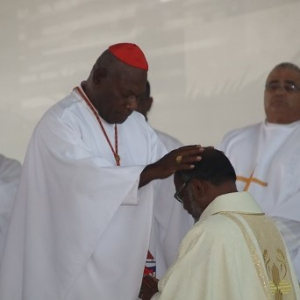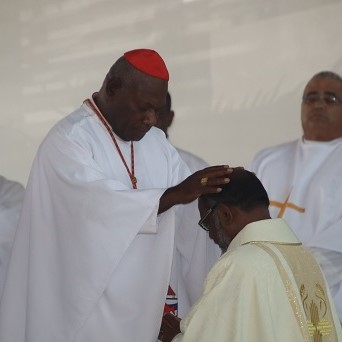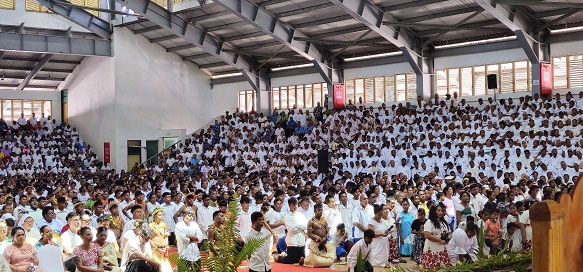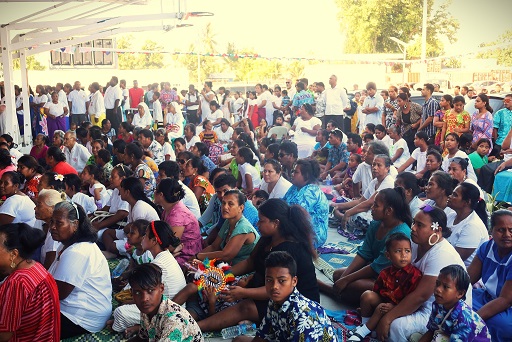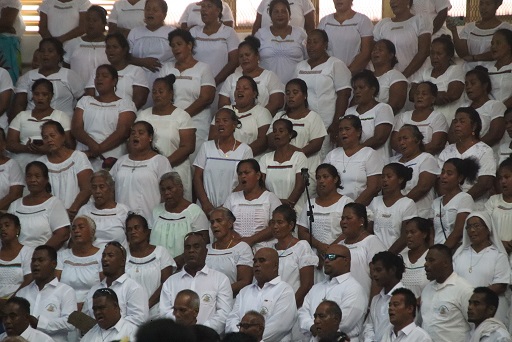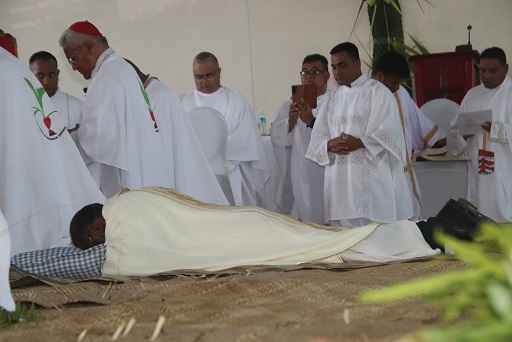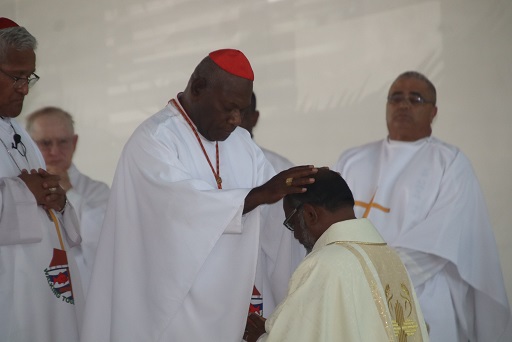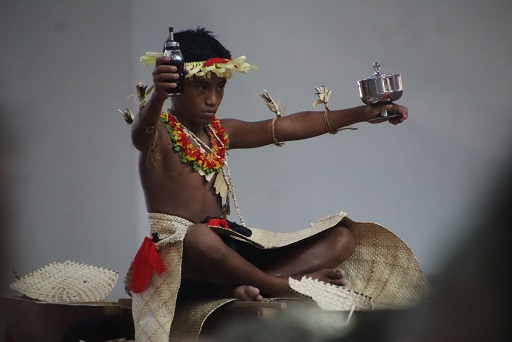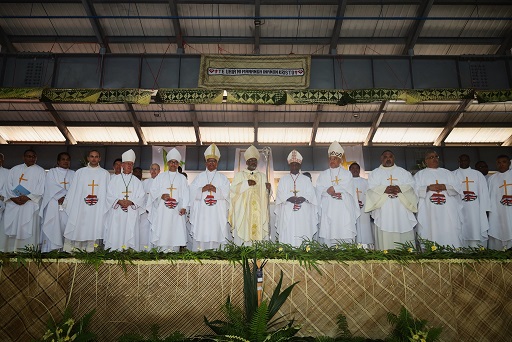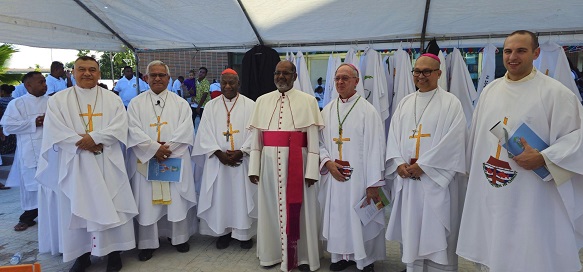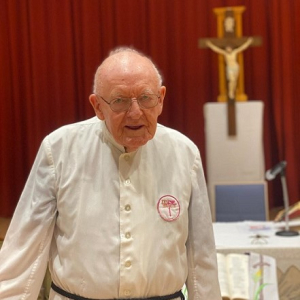Peter MALONE
Celebrating the episcopal ordination of Simon Mani MSC, Kiribati
Celebrating Michael Sims MSC, 60 years ordained
Celebrating Michael Sims MSC, 60 years ordained
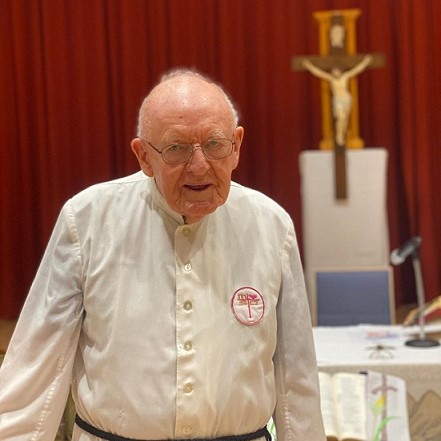
Michael was ordained on the Feast of St James in 1964.
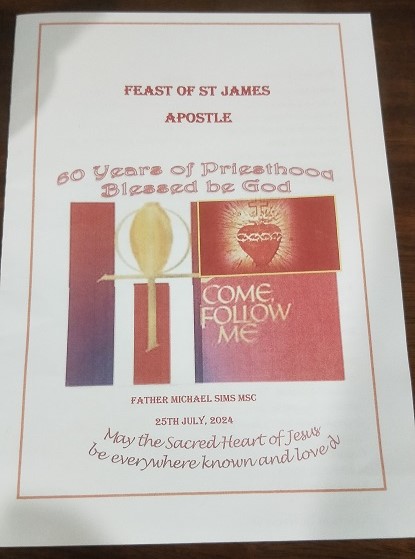
The Melbourne community joined with him, the Little Sisters of the Poor and the residents at St Joseph’s Northcote for his anniversary Mass.
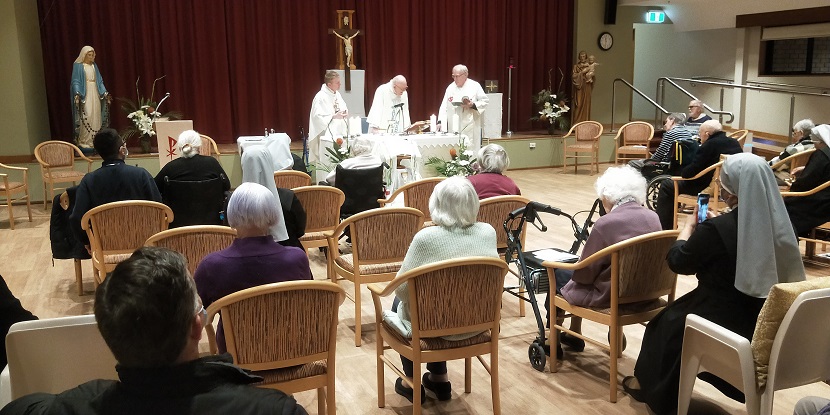
During the Mass, Michael remembered his life and vocation, his years at Port Keats and Bathurst Island and his many decades in Eastern Papua, including ten years on Rossel Island. Earlier this year Michael celebrated his 88th birthday.
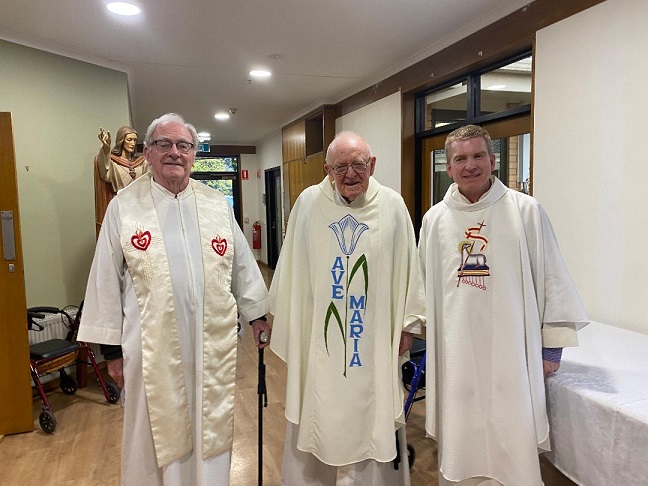
He spoke of first encountering aboriginal art at Port Keats, the circles and dots, the circles of life and the dots, people in one’s life. Hearing confessions there, he could not understand much of what was being said and he applied for time to study the language in Darwin, then mixing with people and becoming more familiar.
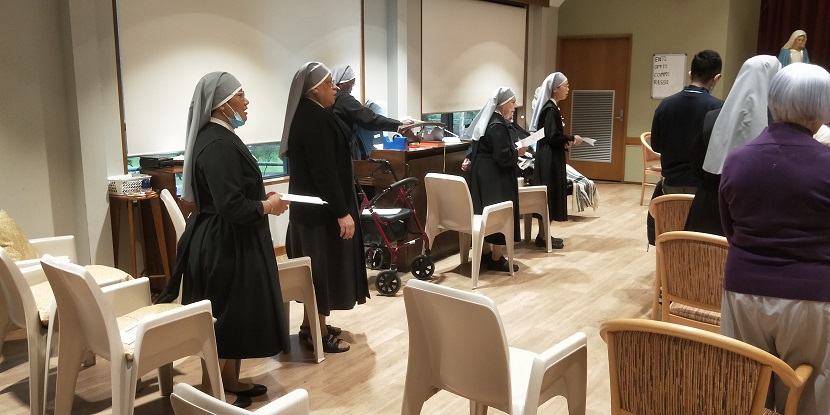
At one Easter, Michael remembers hearing a man movingly say that it was the first time he had heard the story of God’s love for us in his own language.
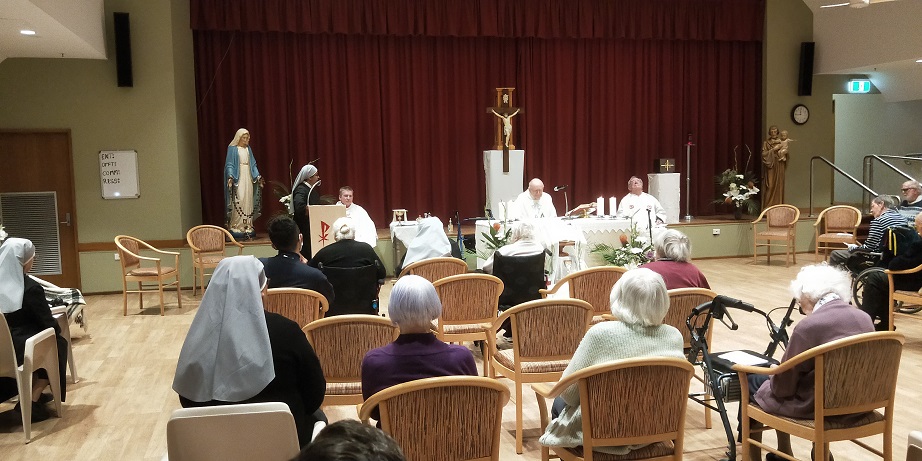
The Superior of the Community, Sister Shanti, spoke warmly of Michael’s commitment in his Chaplaincy and his continued ministry at St Joseph’s.
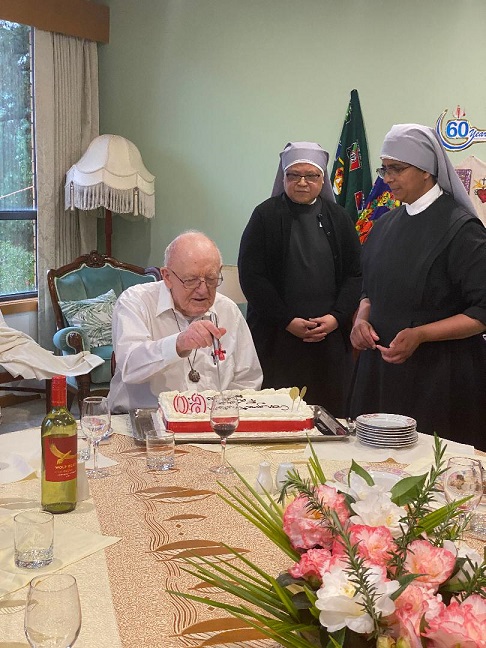

The MSC community were treated to a wonderful lunch and the Sisters and residents joined us for the cutting of the 60 years’ anniversary cake.
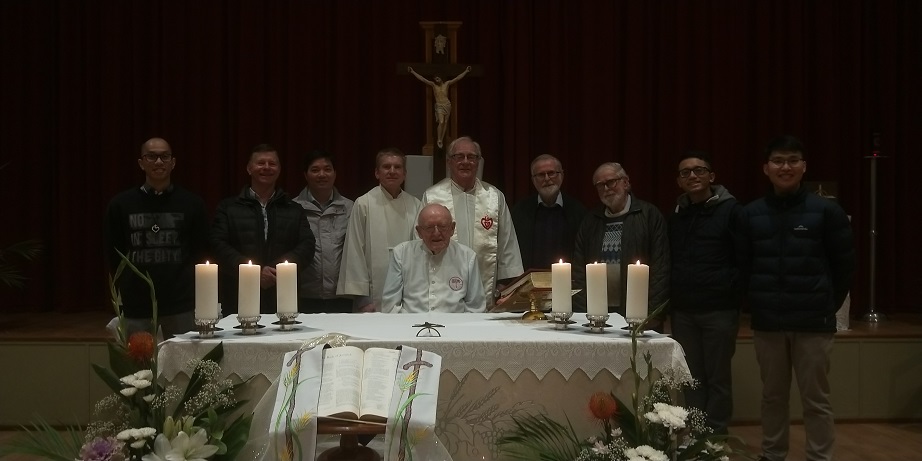
[And, God’s special bonus at this time, Carlton is second on the AFL ladder.]
Photos, Peter Malone and many thanks to Hoa for some extras.
Bonheur des uns.., Le./ A Friendly Tale
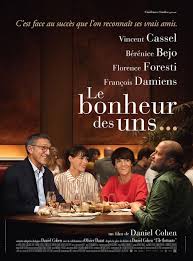
A FRIENDLY TALE/ LE BONHEUR DES UNS…
France, 2020, 104 minutes, Colour.
Berenice Bejo, Vincent Cassel, François Damiens, Florence Foresti.
Directed by Daniel Cohen.
A French satiric film. The English title sounds rather genial. The French title implies rivalry, the happiness of one at the expense of another…
This is a film about four friends. However, the focus is on Lea, played by the always sympathetic Berenice Bejo (A Separation, The Movie Teller). She seems a simple, nice kind of person, happily working in the department store, advising customers about dresses, possibly in line for promotion. However, she is observant, takes notes, creates stories in her mind, eventually writing them down – to great success, her becoming a celebrated author and prolifically producing books. And she remains nice throughout.
But, her best friend, played by Florence Foresti, becomes more and more jealous, badmouthing her friend, she herself trying to write but unable, trying different areas to achieve, finally deciding on marathon running. On the other hand, her husband, played by François Damiens, is much more friendly, his wife encouraging him to explore all kinds of possibilities from art, to music, but he is not being particularly successful.
The other difficult character is Lea’s husband, played by Vincent Cassel in a role rather more different from those he usually plays. He is a believer in the man as the head of the household, works in Vietnam aluminium company and is ambitious, being passed over. However, he gradually comes over to his wife’s point of view, a bit uncomfortable with her growing wealth, comfortable apartment (which her best friend is very jealous of).
The tone is set for the film in a long opening sequence where the four are at a restaurant and a lot of time is spent on Lea having a desert, the other is declining, changing their minds, different possibilities, an exasperated waiter. And, to bring this satiric perspective to an end, a repeat of the restaurant situation and choices.
- The French title, happiness at the expense of others…? The English title and the emphasis on friendship, ironies?
- The French setting, the city, couples and homes, meeting places, restaurants? The publishing world, book signings and tours? The aluminium firm? Work, offices and training, exhibitions? The musical score?
- The focus on the four characters and their interactions? Friends, tensions, rivalries, insecurities, success?
- The introduction to the characters, Lea and Marc, we’re working in the shop and happy, Marc and his ambitions, single-minded, the aluminium company? Comparisons with Francis and Karine? Their marriage, her hopes, his hobbies?
- The opening and closing with scenes in the restaurant, the nature of the friendships, longtime friendships, interactions, humour? The long process of whether to have desert or not, the various combinations strung out, Lea and her reactions? And the waiter and his waiting?
- Lea’s story, her working at the store, the boss and the possibility of promotion, her meeting customers, the woman asking advice about the dress, her giving advice, putting hold, to return the next week, reaction of the boss and loss of custom, the woman returning and buying more clothes? Is recommending her to manage a store? Her lunch, observing people, imagining their stories? Karine joining her, the character of the lady in blue? Lea, her writing, diffident, sending the manuscript, the positive reactions? Audiences losing his sense of real-time, the publication, success, though the books, publications, the reviews, the signings? The effect on her?
- Marc’s story, the marriage, the dominant male, his expectations, the subservient wife, at work, his ambitions, passed over, his enthusiasm for his work and for aluminium, the secretary? The restaurant, controlling Lea? The reaction to her success? Observing, the discussions with the friends, the separation, his motivations? The book signing, his love for Lea, reconciling? The new house and its comfort? His discovering his love for Lea?
- Karine’s story, longtime friendship, comfortable life, relationship with Francis, the meals, her envy of Lear, trying to write a story, not getting anywhere? Her self-confidence? Who supported Francis and his hobbies? Her reaction to Lea’s success, becoming more and more jealous, conversations, insinuations, criticisms, phone calls? The change of hobby, running, obsessive, sequences of running, Francis cheering her on, going to the dinner, her envy of the comfortable house, leaving? And the final dinner and the choices about desert, and the patient waiter?
- Francis and his story, devoted husband, wanting to be a composer, Karine urging him on, some compositions, moving to painting, moving to sculpture, the exhibition the social? Going to train with bonsai? His lack of success? His more simple approach, friendship?
- The background of the world of publishing, the editors, the managers, tours, business, success?
- And the title seen in retrospect of the whole film?
Colors of Evil: Red
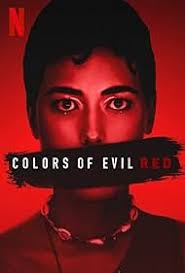
COLORS OF EVIL: RED/ Kolory zla. Czerwien
Poland, 2024, 111 minutes, Colour.
Jakub Gierszal, Maja Ostaszewska.
Directed by Adrian Panak.
|
This is a Polish police investigation, a murder mystery, connections with a case from 20 years earlier, official police thwarting the investigation, a young investigator, ambitious, taking on the investigation himself but approaching the mother of the victim, a judge, and joining with her in the investigation. The young police officer is quite sympathetic, the mother, the judge, antagonistic, personal problems in her own life with her husband. However, they begin to get clues, visit crime scenes, make connections with clubs at a resort, move into the area of organised crime, vice and exploitation – with a final confrontation and revelation. Familiar material in so many ways – but crime investigations are usually intriguing and interesting. |
|
- Crime investigation? Based on actual characters and events?
- The Polish setting, cities, homes, countryside, mansions, police precincts? The musical score?
- The title, the focus on evil, red blood? The visuals of crime, victims, groom and horror?
- The situation, the background of the murdered girl, her relationship with her mother, leaving home, at the club, getting the job, the risky life, the manager, the staff? Her death? The body on the beach?
- Leopold, as police, detective, young, studies, career, ambitions? The attitude of other police? His investigations, the lack of cooperation? His continued investigations, the identity of the murdered girl, the discovery of similarity of murder 15 years earlier? The background of the accused, his being found guilty, in prison, declarations of innocence, the repercussions on his life, out of prison, suspicions again, his suicide?
- Helena, her role as a judge, seen in the court, Leopold and the news of her daughter’s death? Her reactions? Her decision to collaborate with Leopold, using her influences and connections for information? Their work together?
- The murders in the past, discovery of further murders? The search for a serial killer?
- The background of the club, the visits, the staff, the owner? His mansion, lifestyle? His being interrogated, reactions?
- The mystery, the investigation, the suspects? Leopold and his work, perseverance, the effect? Helena on a mission?
- The buildup to the finale, the confrontation, the revelation of the wealthy owner, his self-assertion, guilt? The solution of the crime?
Under Paris/ Sous la Seine
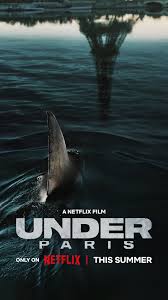
UNDER PARIS/ SOUS LA SEINE
France, 2024, 104 minutes, Colour.
Berenice Bejo, Nassim Lyes, Lea Levisant.
Directed by Xavier Gens.
While they have been some shark films before Jaws in 1975, there have been scores of shark films since. The following Google reference has quite an extraordinary list of these films: https://en.wikipedia.org/wiki/Category:Films_about_shark_attacks.
The time we have a French film. It was released in 2024, some months before the beginning of the Paris Olympic Games. And, it draws on this event for some of its drama.
As a shark film, it is somewhere between Jaws and the Sharknado heightened adventures. It opens in the Pacific, a scientific group, led by the always reliable Berenice Bejo (A Separation, The Movie Teller) backing and giant shark, but tragedy ensuing, the death of her husband. And she returns to Paris laboratory work rather than out at sea.
Some years later, there is evidence of shark presence in the Seine, a challenge to the scientists, but also a challenge to young protesters who want to protect that shark. In the meantime, there are the group of Seine police and their having to cope with the shark’s presence. And, there is the Mayor of Paris, completely absorbed in the success of the forthcoming Games, in denial when told about the shark.
For those who enjoy shark films, there is plenty of shark activity, a large shark, multiple offspring, dangers, the river police diving with some disasters, the head of the police trying to negotiate with the Mayor and being fobbed off, the protesters and the intransigence of the leader, the tracking of the shark on computer screens, the attempt to confront and capture the shark.
And then, in the atmosphere of disaster films, there is the opening of the event in the river, hundreds of swimmers, pursued by the sharks, absolute mayhem – and comeuppance for the arrogant Mayor.
As shark entertainments go, this one should go on fans’ lists.
- The popularity of shark terror of films? The legacy of Jaws? The many shark variations?
- The opening in the Pacific, the waste and rubbish, the trapping of the fish, the sharks, Lilith, the threats, the sharks, the offspring? The crew, the research, Sophie and her husband, the other members, the going out, the attack, their deaths? The impact on Sophie?
- Three years later, the Paris settings, the vistas of the city, of the river, the landmarks, tunnels, the underwater photography, the headquarters of the protesters, the triathlon, the celebrations? The buildup to the climax? The musical score?
- The situation in Paris, the mayor, publicity, international interest, the triathlon? The 2024 Olympics? Cautions about the water in the Same?
- The sharks in the Seine, Lilith, size, spawning, the number of the sharks? The threats?
- The protesters, the group, the cause, determination? The technology to trace the movements of the sharks? The young woman, a demonstrations, intransigence? The support of her team, their enthusiasm, meetings? The technician, her doubts, going to see Sophie, the plans to counteract the protest?
- Adil, the police, the patrolling the rivers, their authority? The team work, the meetings with Sophie, the advice, the tensions, the searching, finding the sharks, trapping the sharks, and water? The deaths and the police grief?
- The police, the liaison with the mayor, the visits to the mayor, eating a meal, disdain, her advisers, determination about the triathlon? The exasperation of the police, their activities despite the disapproval of the mayor?
- The triathlon, the speeches, the crowds, the swimmers, going into the water, the police trying to ward off the sharks, the protection? The sharks loose, the massacre? Reaction of the crowds? The mayor?
- The technician and her advice, the tracking, the protesters, the police, the buildup to the confrontations? Lilith and the many offspring?
- Sophie and Adil, bonding? Working together, the dangers and threats? His injuries?
- Success? Temporary? The future?
Sympathiser, The
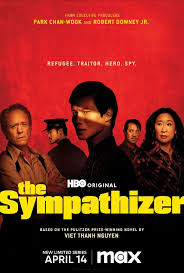
THE SYMPATHISER
US, 2024, 7 x 60 minutes, Colour.
Hoa Xuande, Robert Downey Jr, Fred Nguyen Khan, Vy Le, Toan Le, Duy Nguyen, Alan Trong, Sandra Oh, David Duchovny, John Cho, Marc Whittington Cooper.
Directed by Park Chan-wook, Marc Munden, Fernando Meirelles.
The Sympathiser is a seven part television miniseries, created by Korean director, Parker Chan-wook and Canadian, Don McKellar. It had three directors, Park Chan-wook, Mark Munden and Brazilian, Fernando Meirelles. It has a strong lead in Australian actor, Hoa Xuande, who has appeared in many Australian films and television productions. It was produced by Robert Downey Jr and his wife – with the actor taking on seven quite different character roles, sometimes unrecognisable at first, throughout the series. By and large, the cast has Vietnamese actors in central roles and as extras. The American cast includes Sandra Oh, David Duchovny, John Cho, Marc Whittington Cooper.
The series takes the audience back to the last days of the Vietnam war, 1975. The fall of Saigon is imminent, there is a dramatic presentation of the difficulties in Americans trying to depart, the plains, the crowds, the Vietcong coming in, running to get on board.
The sequences before the escape to the United States focus on a young man, from the North, acting as a double agent, his being controlled by the CIA, and yet his trying to get information to the North. And there are flashbacks to his younger days and, especially, to his two friends, one his contact in the North, the other a friend who escapes to America. The sequences bring American interrogation and counterespionage to life.
Most of the action takes place in the United States, the control urging the young man to go to the United States where he had previously studied and had contacts. And, he accompanies the general for whom he worked in Saigon. The film shows the plight of the Vietnamese exiled from their country, making their way in the United States, banding together, plans to return to Vietnam victorious.
Over the series, the film tracks the life of the spy, his contacts and messages back home, a romance, a meeting with a past friend, the general and his plot for returning to Vietnam…
The framework of most of the series is the young man in a concentration camp in the North, over the period of the year, writing his memoirs for the authorities, continually altering the narrative which is visualised. There is some final revelations about the camp, and an open ending as to what will happen to him next…
- The title? The Pulitzer Prize-winning novel? The impact for American audiences, Vietnamese audiences?
- The international filmmakers, directors, Korea, Britain, Brazil, adapters, Korea, Canada? The Vietnamese cast? Americans? The many roles of Robert Downey Jr?
- The impact of the series, seven episodes? The perspectives, the Vietnamese perspectives, the North, the South? American? In the hindsight of the decades after the fall of Saigon?
- The impact of the narrative, the focus on Captain, his confession, his memories, distortions, lies, mistakes, his changing, the scenes of his interviews with the Commandant, the rewriting, the volume of writing, over one year, the ultimate document?
- The character of the Captain, the performance by Hoa Xuande, his background, as a boy, his friendship with Bon and Man, the blood bonding and the cut in their hands? His mother, the French father, the later revelation of his being a priest? Condemned as half breed? His mother saying he was twice valued? The bullying in the past? His motivations? Adult, becoming an agent, loyalty to the North? At work in the south, planted, with the Americans, his work, employed by Claude, the writing of the confession, in the different times, back and forth, perspectives on his character and action?
- Claude, his look, Robert Downey Jr, the CIA, his hold over Captain, his style, the pressures, the tasks, the theatre sequence, Death Wish on the hoarding? The interrogation of the agent, torturing her, the Captain confronting her, with his eyes, swallowing the material, forcing it out? Later, the torture with the bottle, and the memories of the rape? The fact of her being in captivity, re-education, her story, reading Captain’s, his reading hers? Staying in the camp?
- The General, his position, his wife in society, daughter and ambitions, his being on the staff, the torture and the interrogation, the General relying on Captain, decisions, trusting him, the imminent fall of Saigon, the list and Captain’s decisions, motivations? Confronting the officials, leaving the gun and the official taking the candy?
- The character of Man, the contact from the North, his decision that Captain should go to America? Bon, his wife and child, the friendship, scenes together?
- The fall of Saigon, vividly captured, the bombs, the airport, those fleeing, the planes? Bon and the death of his wife and child, Captain urging him on, getting on the plane, the feelings on the way to the US?
- Captain and his attitude, his loyalties, the past, his studies in the US, the language, his happy memories, music? The friendship with The Professor? The General and the family, the camp, born in the camp, the hard life, the move to California?
- California, the General and his decline, drinking, his change, paranoia, suspicions, wanting rivals killed, plotting with Captain? His liquor store? His wife, adapting to America, the restaurant? The daughter, liking America, escaping with Captain in the car, on the film set, infatuation with the singer? Performing? Captain and his reaction to the rape sequence? Her becoming a singer?
- Man, the secret ink, the communications, Man wanting him to stay in the US?
- Bon, the revelation about his being an assassin? The friendship, the choosing of a suspect for assassination and plotting, His double dealings with the candy? The setup, the brutal killing?
- The character of Sonny, the past link with Captain, journalist, his articles, the relationship with Sophia, the challenge, Captain sending the photos to him, the revelatory article? And the decision to kill him?
- Sophia, Asian, American, older, work in the office, relationship with the Captain, then with Sonny?
- The making of the film, Captain and his decision, the support of the General, discussions with the erratic director, his performance, attitudes? The support of the professor, of the hard-nosed politician? On set, the details of the filming, lines for the Vietnamese and Captain’s campaign, the assistant director and getting Vietnamese extras, their arrival, their not wanting to recite lines from the North? The recreation of the village, the set designer and the tour for Captain, the scenes in the village, the director and his rewrites? The American actor, savage, echoes of Apocalypse Now? The rape sequence and Captain’s intervention? His being fired? His going to the cemetery, his mother’s grave, the explosions, the consequence, hospital? Visit from Bon, Sophia, Sonny?
- The general and his plan, his squad, out in the desert, the drills? Captain and his reaction? The General relying on him, his finally agreeing to accompany the group to Bangkok, Man and his urging him not to come? The arrival, the travel, the incursion, the capture?
- The re-education camp, the physical nature of the camp, the prisoners, Captain and his year in solitary, writing and rewriting, interviews with the Commandant? The meeting with the masked commander? The revelation, the napalm, Captain and his discussions with Man, Bon and his endurance? And the plan to set them free, the disguise of the mask, leaving, to where?
Half of It, The

THE HALF OF IT
US, 2020, 104 minutes, Colour.
Leah Lewis, Daniel Diemer, Alexxis Lemire, Wolfgang Novogratz, Collin Chou, Betty Ann Baker.
Directed by Alice Wu.
This is a very sympathetic coming-of-age story, with a special emphasis on same-sex orientation, this theme also being explored very sympathetically and not sensationally in any way.
At the centre is Ellie, a persuasive performance by Leah Lewis, her talented father, migrant, only able to get work in the United States managing a small railway station in a remote town, his daughter helping him with the work. She is a loner. However, she is very intelligent, and audiences discover that she has been writing the assignments for many of her class, even though the despise and bully her. The teacher knows this and encourages her for further studies.
Then the film becomes something of a cleverly updated variation on Cyrano de Bergerac. Her neighbour, Paul (Daniel Diemer) is in the diner run by his mother with her own special recipe for sausage. Paul has ambitions to develop sausages in his own style. Paul is infatuated with a girl at school, Aster(Alexxis emire). She is the daughter of the local Deacon. And, everybody expect her to marry the local Jock, Trig.
Paul approaches Ellie who then provides him with speeches and conversation points for meetings with Aster, also controlling his phone calls which leads to all kinds of mixups.
Paul eventually comes to realise his awkwardness in the situations, despite all of Ellie’s help, also feels attraction towards her – with the ultimate realisation of her love for Aster, speeches in the church urging the congregation to sympathy, Paul discovering that Ellie has sent his recipes to authorities for promoting them.
The film does not end with everything neatly organised. In fact, audiences would probably like to know more about the characters and what happens to them and their future lives.
- The title, the introductory explanations, Plato’s theme, the image of the person, the two halves, the separation, the search? The serious elements from Greek philosophy? And the screenplay suggesting undermining in contemporary US? The range of quotes, even from Ellie?
- The story of older teenagers? Different family backgrounds? Migrants to the US? Local families? School backgrounds? Church backgrounds? Job opportunities?
- The name of the town, its tone, middle America, the entry sign, the road? Homes, the railway station, diners, school, church, the choir, music courses and performances? Religious services, the Deacon and his preaching, the off-remarks of the priest?
- Ellie’s story, the performance and presence of Leah Lewis, age, reticent, intelligent, riding her bike, mocked by the students, chugging, yet her writing their assignments? Her music? The attraction to Aster? At home, with her father? The background, coming to the US, his qualifications, but not speaking English will, his work at the railway station, her helping? His watching the television, sad at the death of his wife, the “best parts” in the movies, Casablanca ending? The meals, the Chinese style? Adapting to the US?
- Ellie, her relationship with the teacher, the teacher with a touch of the cynical, knowing the essays were written by her, her discussions, hopes for Ellie? Observing? Enjoying the outcomes?
- Paul, tall, a touch awkward, the sequences with his large squabbling family, his attraction to Aster? Approaching Ellie to write a letter? Her reaction? Need for money for the house? Accepting? The first letter?
- Aster, her place in the school, quiet, attractive, Trig and his presumptions, with her, the expectations of marriage? The painting? The discussion about important strokes? And sequence with the graffiti on the wall and she and Ellie painting? The later painting of the flower and giving it to Paul? Her ambitions further studies? But caught in Trig’s presumptions?
- The variation on Cyrano de Bergerac? The voice of Paul, the words of Ellie?
- The development of the letters, the texts, the text names, references to books, The Remains of the Day, philosophy, ideas? Paul out of his depth? The awkward meetings, the confessional, the priest bewildered, the conversations? Ellie watching, coaching? The changing contents of the letters? Ellie’s outpourings to Aster?
- The bonding between Ellie and Paul, friendship, her control of him?
- Trig, at school, the extrovert, presumptions, the musical performance, self-centred? Thinking that Ellie was attracted to him? And the proposal for Aster?
- Ellie, the party, the drinking, Paul taking her home, at the house, the kiss, Aster misunderstanding?
- The comic touches with the misunderstandings, Ellie and the contents of her letters, too much for Paul, yet his trying with his reading?
- Paul, his ability to cook, the recipes, his mother’s traditions, the work with Ellie’s father, bonding? His future?
- The revelation, the effect on Aster, on Ellie, Aster going to art school, Ellie going to college, Paul staying with his cooking?
- A quiet film about same-six attraction, a pleasing and respectful attitude towards the subtleties in such potential relationships?
Tenor
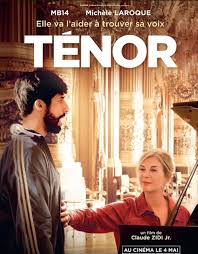
TENOR
France, 2022, 100 minutes, Colour.
Michele Laroque, Mohammed Belkhir (MB14), Guillaume Duhesme, Maeva El Aroussi, Samir Decazza, Marie Oppert, Louis De Lavignere.
Directed by Claude Zidi Jr.
The Tenor is a surprising film, very entertaining.
The film opens with with a bare knuckle fight, rivalry in a local gang in a Paris neighbourhood, and will end with the singing of Nessun Dorma, quite a journey in between.
The young central character, Antoine, a fine performance by Michele Laroque, is part of the gang, cared for by his older brother who is one of the combatants in the initial fight. Antoine is skilled at creating rap songs and performing them, again a competition among the gangs in the neighbourhood. Antoine earns part of his living by delivering sushi from a local restaurant.
When he delivers sushi at the Paris Opera house, he hears a young woman singing and is entranced. He is very forward, make something of a scene at the Opera house but is invited back by the Diva (who has a terminal illness).
What follows is something like a Pygmalion story, the young man giving an audition, discovering his operatic talent, going into training, clashes with the Diva, with some of the other singers, used by an aristocratic singer to enhance her own reputation, especially at a performance at her wealthy mansion. His brother and those in the neighbourhood are not aware of what is happening to Antoine.
There is a performance by Opera singer, Roberto Aragni, who encourages Antoine.
Quite a lot of music, and in fact, quite a lot of rap, even the Diva enjoying it, a final competition, then a revelation of the truth, a challenge to the brother who had been in prison, a friend who had joined the army, and the whole group gatecrashing Antoine’s final audition.
Well acted, well sung (rap and Opera), often quite exhilarating.
- The title, Antoine, skilled rap artist, singing voice, Opera?
- The French settings, the neighbourhoods, wealthy and poor? Racial differences? Gangs? Paris Opera house, the visuals, exteriors and lavish interiors, mansions and theatres, clubs, martial arts and boxing rivalries, rap rivalries?
- The music, the rap rhythms, the rap lyrics, however, aggressive, taunting, witty? The performances and the competitions? The acknowledgement of Tupac Shakur? The Opera singer and her movements to the Tupac music? The contrast with, comparisons with Opera? The range of excerpts? The Opera singer, Roberto Aragna and his performance? Madame Butterfly, Nessun Dorma… Performances, duets, solos?
- The atmosphere of the opening, the brutal fight, the crowd cheering, blows, collapses? And the contrast with the ending and Antoine singing Nessun Dorma, and his achievement?
- Antoine’s story, with his brother, his brothers fighting, looking after him, living together, ambitions for Antoine, the economics course and his ability to answer questions, the admiration of the professor, urging him to come back? His work delivering sushi? His skill with rap lyrics and music, his performance, lively, the support of the Rembrandts, the attack of the Picassos, his being beaten? The friendship with Samia, her going into the Army, her attraction and attachment, his seeing her as a friend? Ellio and the other friends, their support? With his brother and his training? At home?
- Delivering the sushi, to the Opera house, his admiration for the singer, the clash with Maxime, taunts, his voice, Madame hearing him? His going off in a huff? Madame going to the sushi centre, tracking Antoine down? The delivery, the discussions, the to and fro, her challenging him? The return, the breathing exercises, the diaphragm, his ignorance and not knowing what the diaphragm was, his response to the exercises, even doing the rap more effectively? Her giving him the CD of Madame Butterfly, his listening and its effect? Taking him out of himself?
- Madame, her physical condition, her drinking, the discussions with Pierre, requesting him to accept Antoine, his wanting her to go to Korea to sing, her refusal? Taking Antoine to the opera, his hearing Roberto sing, singing with Roberto, Pierre’s change of attitude?
- The training, the attraction to Josephine, the duet with her, her inviting him to the family, her performance and humiliating him? The clashes with Maxime, the fights, rivalry, singing together but different styles? Yet Maxime befriending him, his own story, giving him shelter, the friendship, the final support?
- Samia, going to the Army, the significant move for a woman, the training sequences, the discussions about relationships, her going to see Antoine, introduction to Josephine, her being hurt?
- Antoine and his progress, practices, missing his brother’s fight, the police arriving, his brother’s arrest, jail, thinking of the excuse for their mother and his being in Japan, the phone calls, the posters in the cell? His getting out? The confrontation with Antoine and his angry outburst?
- Antoine, upset, the training, going back to class for the economics class, Samia hostile, confused?
- The audition, his not singing well, walking out after being late, Madame and her taunts? His reaction?
- The confrontation at the club, his punching his opponent, walking out? Lonely, the support of Maxime?
- His brother, angry with Antoine, his room, throwing the musical score out the window, Samia seeing the invitation, her rounding up everyone, persuading the brother, the decision to go to the audition? The letter from Madame, his apology?
- Madame, her illness, short time to live, talking with Pierre, wanting to enjoy the wine and the music? The letter to Antoine, the voice-over? And the blood drops on his musical score?
- Antoine, ready for the audition, the audience waiting, his brother and Samia all coming in, the quality of his singing, Nessun Dorma and conquering with Vincera? The acclaim? The reconciliation?
- The final image of Antoine, Opera singer, content in himself, his achievement? His future?
Kinds of Kindness
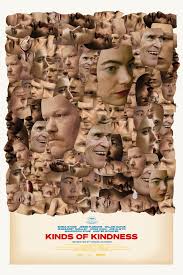
KINDS OF KINDNESS
US, 2024, 164 minutes, Colour.
Emma Stone, Jesse Plemons, William Dafoe, Margaret Qualley, Hong Chau, Joe Alwyn, Mamoudou Athie.
Directed by Yorgos Lanthimos.
Writer-directors, Yorgos Lanthimos, would probably agree that his perspective on life, especially in his earliest films, was “warped”. And, with Poor Things and Kinds of Kindness, that his sense of humour was also “warped”. His kinds of kindness are not exactly kind. Something more like “destructive kindnesses”.
This is a film containing three films linked by themes and linked by the actors. It is a cinematic triptych. Each panel of a triptych to be seen by itself, but also with its links to the other panels, combining for an overall view. And this seems to be what the director wants here, three stories, and a linking theme. Overall, it is a theme of coercive power. And that coercive power means extreme manipulation of victims, tyrannical domination mixed with power complacency, physical and mental cruelty and violence. But, with his warped sense of humour, the director also offers wry satire.
The contribution of a core cast enhances the impact of the drama/humour. Emma Stone has proven herself with two Oscars, appearing in the director’s The Favourite and winning her second Oscar for Poor Things. She shines as the principal character in the third story, a story of a pseudo-messianic cult, she has a divinity in search of a religious figure who has the power to raise people to life. The power of the cult dominates her and her companion in the search.
Jesse Plemons (in 2023 Killers of the Flower Moon, Civil War) won the Best Actor award at the 2024 Cannes film Festival. He shines in the first of the stories, a primly rather straightlaced yes-man to a controller who can only be described as wicked (Willem Dafoe who also appears in the three stories). In a moment of moral questioning, his morale collapses, made to feel even more dependent than before, commanded to kill someone. By contrast in the second film, he plays a police officer is anthropologist wife disappears, reappears, his moral and mental collapse as he determines that she is a double. And this part of the triptych also introduces the theme of cannibalism.
Each story shows the versatility of the characters and the talent of the rest of the cast, Dafoe, Margaret Qualley with four roles including twins, Hong Chau, Joe Alwyn and Mamoudou Athie.
So, after watching the three stories, the three panels of the triptych, the audience is left quite disturbed, moments of black humour, moments of horror, moments of disgust, some grim perspectives on the shallowness, the malice, the cruelty of human nature.
- The work of the director, perspectives, offbeat? Greek background? International career and outreach?
- The title, the tone, the issues? Irony, satire, absurdity? Black and bleak perspective?
- The film as a triptych, the one film, the three parts interconnecting: coercive power, manipulation and submission, aberrant behaviour, sex and violence, violent deaths?
- The work of the cast, in each story, different, appearance, accent, behaviour…?
- The first story: the focus on Robert, exact, controlled, look and clothes, diet, relationship with his wife,+? The encounters with Raymond, his personality, appearance, speaking, controlling, with Vivian as his companion, the meetings with Robert, the international business, the order to kill the victim, Robert’s failures, change of heart, anguish, changing eating habits, going to Raymond, rebuked and rejected by Raymond, the past encounters, sexual? The gifts of the sporting trophies, the gift of the racquet, Robert and his wife, valuing the trophies? The disappearance of the is one? The buyers and the possibilities of selling the trophies, the bargaining? Robert and his encounter with Rita, organising the date, her being in hospital, his discoveries at seeing Raymond, her being controlled, failing with the killing? His change of heart, going back to Raymond, and the vicious running over the victim? And his contentment in the threesome?
- The second story: Daniel, policeman, good service, friendship with Neil, the discussions, the meal, Neil and Martha, memories of Liz, the issue of the video, their watching, the shock of the group sex? Daniel, Liz surviving, the other members of the expedition dead? Hospital? His erratic behaviour, police work, the shooting of the passenger, licking the blood, being suspended? Neil trying to help? At home, the interactions with Liz, her behaviour, different? With her father, narrating the dream, dogs living as humans? Going to please Daniel, his withdrawing, not eating, asking her to cut off her finger, her cooking it, his giving it to the dog? Her frustration, his demanding the liver, her cutting it out? The alternate Liz, arriving, his embracing her??
- Third story: the background of the cult, the members, garb, the enclosure, the rituals? The leadership of Omi and his wife? Manner, style? Emily and Andrew, members of the cult? Emily and her control, going to the morgue, choosing the girl as able to raise the dead, the attendant, the corpse, her attempt a raise the dead, her desperation, rejected? Emily and Andrew, their travelling together, a speedy and reckless driving, the mission, searching for the special person who can raise the dead? Emily, her visits to her daughter, leaving the presence? The encounters with her husband, her daughter? The invitation to the meal, the drugs and headroom, his rape, her being rejected by the cult? Her growing desperation, the instructions by Omi and his wife? Her dream, drowning, the rescue? Rebecca, coming to the diner, the explanations? Emily, her decisions, pretending to have the dog, wounding it, Ruth as the vet, kindly? The next encounter, bugging Ruth, Rebecca satisfied, killing herself, going to the morgue, the dead body, Ruth – and the raising to life? Andrew and Emily reinstated?
- The mid-credits final sequence, the irony of the dead man raised to life, after being killed by Robert, raised by Ruth, and eating the sandwich and spilling the ketchup? Final ironies?
Eat Wheaties!/ Dear Elizabeth
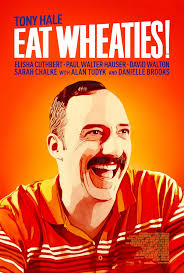
EAT WHEATIES!/ DEAR ELIZABETH
US, 2021, 88 minutes, Colour.
Tony Hale, Alicia Cuthbert, Danielle Brooks, David Walton, Alan Tudyk, Sarah Clarke, Paul Walter Hauser, Robbie Amell, Kylie Bunbury. With thanks to Elizabeth Banks.
Directed by Scott Abramovich.
Tony Hale is very well known to television audiences, 65 episodes of Veep, 84 episodes of Arrested Development as well as many films and other television series.
This is his film.
He plays a genial middle-aged man, competent in his work, but rather simple in many of his approaches to life. It is one a sympathetic brother and an unsympathetic sister-in-law. He is awkward in relationships. And he has a sometimes peculiar sense of humour which irks some of his audience.
There is a reunion for his college group and he is asked to be on the coordinating committee. The key to the film and his response is that he was at college with actress and director, Elizabeth Banks, dating one of her sorority sisters. He makes a lot of this – writing to her agent for an autographed photo as a gift for his brother, sending it back when it is smudged, alienating her agent with his continued requests, her eventually getting a restraining order on him – which, of course, bewilders him.
He decides to overturn the restraining order, finding lawyers too expensive but finding one, played by Paul Walter Hauser, with an online qualification but less expensive. A lot of the enjoyment in the latter part of the film is the court case, the speeches, the antagonism of the agent, the attentive listening to the judge, and the lifting of the order.
Alan Tudyk plays a sympathetic friend who turns on him. There is the reunion, his being shunned.
But, there is a happy ending, the sister-in-law giving birth and becoming more sympathetic, his invitation to be godfather, and finally, a message from Elizabeth Banks who has been away and not privy to all the upsets, a sympathetic message.
And, the titles? Dear Elizabeth is obvious. But Eat Wheaties! is a quote from Elizabeth, encouragement, that she used in her early years.
- The two titles, dear Elizabeth Banks, her saying, “Eat Wheaties!”?
- Offices, homes, barbecues, hospitals, class reunions, the courts…? The musical score?
- Tony Hale as Sid Straw? A good man, limited, work at the office, relationship with his brother, Tom, the jokes at the wedding and Jenny’s reaction? His long speeches and jokes? With people at the office, Bruce? Black joked with Sam? The meeting with Katelyn, the outing, the night together, her later reactions, the breakup? His acceptance?
- The question of Elizabeth Banks, class reunion, his being the co-chair, the organisation, his memories, dating one of Elizabeth Banks’ sorority sisters? Asking the signed photograph for his brother’s birthday? The smudged copy? His continued appeals, agent, Frankie and her harsh reactions, the sympathetic assistant? Asking for the restraining order, its imposition, the effect on Sid, approaching the various lawyers, their costs, finding James Risk, with his family, qualifications, online degree, dodgy, less expensive? Sid going with him, the friendship, in the court, James and his speeches, awkward, his impassioned plea? And winning the case, going back to Bruce and the other managers, apologies and recompense, the previous insult at the bank, showing the tellers the cheques, going to a bank which is courteous?
- The online posts, poetry, outpourings, his not realising they were going viral, his brother’s response, the agent’s response, the reaction in the office, Bruce giving notice, firing him? His attempts at other jobs?
- Sid and his being friendly, his brother’s speech about him and their friendship, support, Jenny objecting, her later relenting, his speech before the guests arrived, Brandon and the jokes, Alison, the connection with Frankie? Alison in the court prosecuting for Frankie? And the birth of the baby, their asking him to be Godfather and laughing at jokes?
- Wendy, at the diner, friendly, chatting, giving him the drinks, the final talk, at the hospital, the kiss?
- The reunion, the various meetings with Dave Lambert, friendship, his son, the smells? Dave not wanting to mix with Sid? The guests awkward?
- Sid, writing the children’s book, the recitation, the publication, success? Softball sequences, David and his son? Sid finally enjoying softball?
- And the finale message from Elizabeth Banks, and the outreach to Sid?
